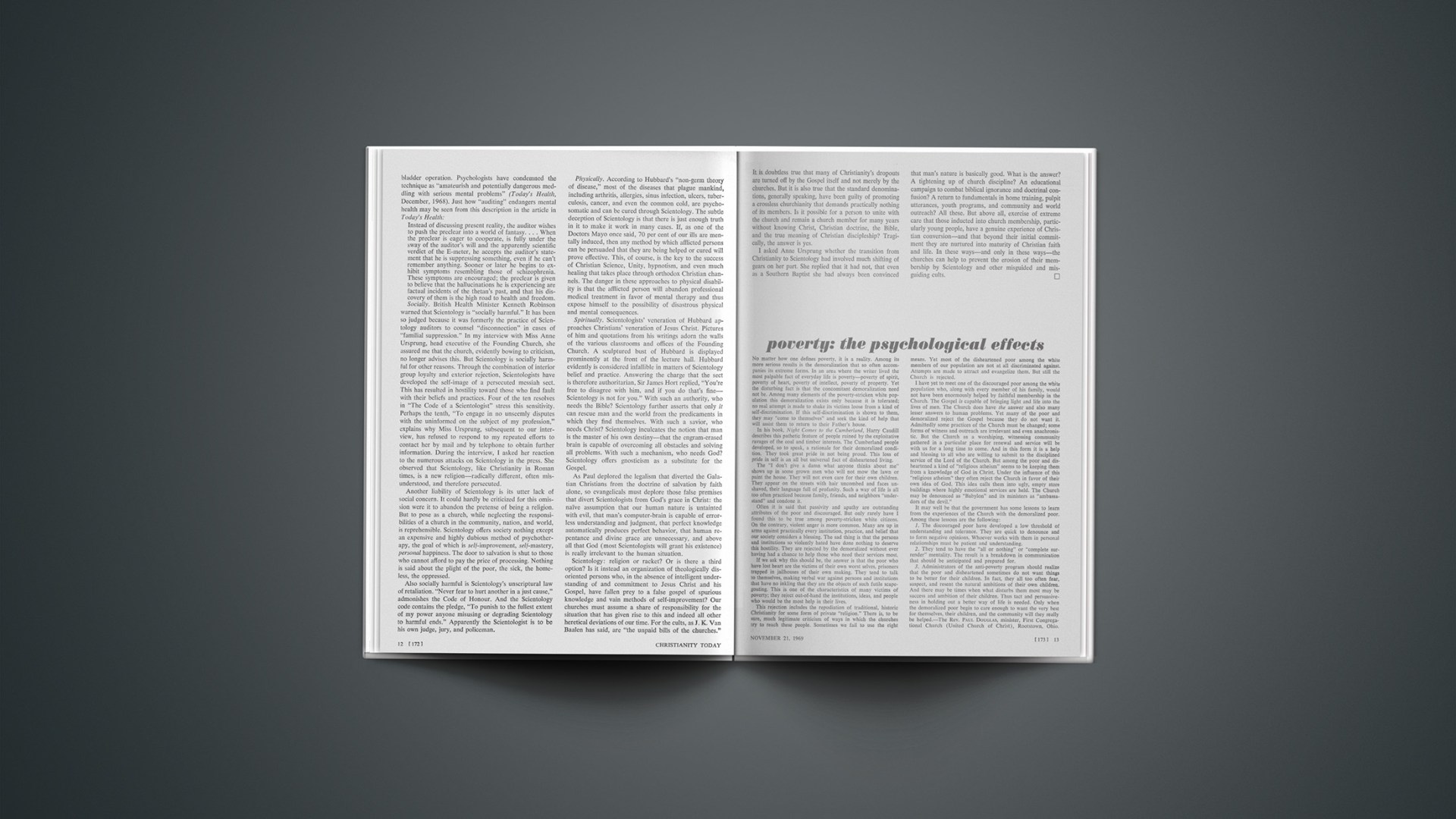No matter how one defines poverty, it is a reality. Among its more serious results is the demoralization that so often accompanies its extreme forms. In an area where the writer lived the most palpable fact of everyday life is poverty—poverty of spirit, poverty of heart, poverty of intellect, poverty of property. Yet the disturbing fact is that the concomitant demoralization need not be. Among many elements of the poverty-stricken white population this demoralization exists only because it is tolerated; no real attempt is made to shake its victims loose from a kind of self-discrimination. If this self-discrimination is shown to them, they may “come to themselves” and seek the kind of help that will assist them to return to their Father’s house.
In his book, Night Comes to the Cumberland, Harry Caudill describes this pathetic feature of people ruined by the exploitative ravages of the coal and timber interests. The Cumberland people developed, so to speak, a rationale for their demoralized condition. They took great pride in not being proud. This loss of pride in self is an all but universal fact of disheartened living.
The “I don’t give a damn what anyone thinks about me” shows up in some grown men who will not mow the lawn or paint the house. They will not even care for their own children. They appear on the streets with hair uncombed and faces unshaved, their language full of profanity. Such a way of life is all too often practiced because family, friends, and neighbors “understand” and condone it.
Often it is said that passivity and apathy are outstanding attributes of the poor and discouraged. But only rarely have I found this to be true among poverty-stricken white citizens. On the contrary, violent anger is more common. Many are up in arms against practically every institution, practice, and belief that our society considers a blessing. The sad thing is that the persons and institutions so violently hated have done nothing to deserve this hostility. They are rejected by the demoralized without ever having had a chance to help those who need their services most.
If we ask why this should be, the answer is that the poor who have lost heart are the victims of their own worst selves, prisoners trapped in jailhouses of their own making. They tend to talk to themselves, making verbal war against persons and institutions that have no inkling that they are the objects of such futile scapegoating. This is one of the characteristics of many victims of poverty; they reject out-of-hand the institutions, ideas, and people who would be the most help in their lives.
This rejection includes the repudiation of traditional, historic Christianity for some form of private “religion.” There is, to be sure, much legitimate criticism of ways in which the churches try to reach these people. Sometimes we fail to use the right means. Yet most of the disheartened poor among the white members of our population are not at all discriminated against. Attempts are made to attract and evangelize them. But still the Church is rejected.
I have yet to meet one of the discouraged poor among the white population who, along with every member of his family, would not have been enormously helped by faithful membership in the Church. The Gospel is capable of bringing light and life into the lives of men. The Church does have the answer and also many lesser answers to human problems. Yet many of the poor and demoralized reject the Gospel because they do not want it. Admittedly some practices of the Church must be changed; some forms of witness and outreach are irrelevant and even anachronistic. But the Church as a worshiping, witnessing community gathered in a particular place for renewal and service will be with us for a long time to come. And in this form it is a help and blessing to all who are willing to submit to the disciplined service of the Lord of the Church. But among the poor and disheartened a kind of “religious atheism” seems to be keeping them from a knowledge of God in Christ. Under the influence of this “religious atheism” they often reject the Church in favor of their own idea of God. This idea calls them into ugly, empty store buildings where highly emotional services are held. The Church may be denounced as “Babylon” and its ministers as “ambassadors of the devil.”
It may well be that the government has some lessons to learn from the experiences of the Church with the demoralized poor. Among these lessons are the following:
- The discouraged poor have developed a low threshold of understanding and tolerance. They are quick to denounce and to form negative opinions. Whoever works with them in personal relationships must be patient and understanding.
- They tend to have the “all or nothing” or “complete surrender” mentality. The result is a breakdown in communication that should be anticipated and prepared for.
- Administrators of the anti-poverty program should realize that the poor and disheartened sometimes do not want things to be better for their children. In fact, they all too often fear, suspect, and resent the natural ambitions of their own children. And there may be times when what disturbs them most may be success and ambition of their children. Thus tact and persuasiveness in holding out a better way of life is needed. Only when the demoralized poor begin to care enough to want the very best for themselves, their children, and the community will they really be helped.
—The Rev. PAUL DOUGLAS, minister, First Congregational Church (United Church of Christ), Rootstown, Ohio.










